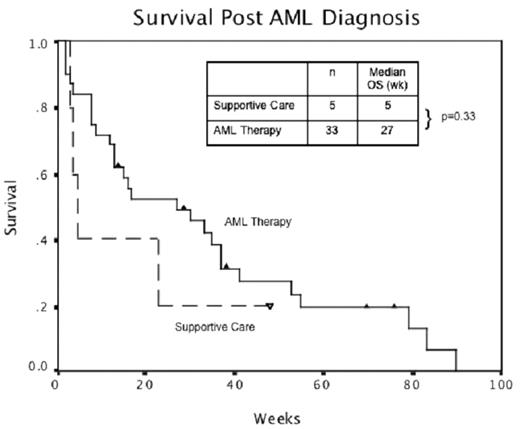Abstract
Antecedent hematological disorder (AHD) is a known adverse prognostic factor for patients with AML. AHD, however, encompasses a range of diverse hematological disorders. The characteristics and outcome of AML evolving from myeloproliferative disorders (MPD) without features of dysplasia remain poorly defined. Between 08/73 and 01/06, 76 patients were treated at the MD Anderson Cancer Center for AML evolving from a previous MPD. Of these, 38 were excluded from further analyses: inadequate pathological information for confident diagnosis of MPD (n=15), concomitant myelodysplastic features (n=11), chronic myelomonocytic leukemia (n=4), and less than twelve months between MPD diagnosis and AML occurrence (n=8). Baseline characteristics of remaining 38 patients with well-characterized MPD: median age 51 years (range 24–70); male 61%; cytogenetics - diploid 86%, del20q 14%; splenomegaly 27%. Diagnoses by WHO classification: polycythemia vera 47%; myelofibrosis 24%; essential thrombocythemia 18%; chronic MPD unclassifiable 11%. MPD therapy: hydroxyurea in 87% (median 3 years exposure), alkylating agent in 16%, and radioactive phosphorus in 8% of patients. AML occurred a median of 111 months (range 22 – 376) after MPD diagnosis. Median age at AML diagnosis was 65 years (range 40–81); cytogenetics were poor risk (−5, −7, 11q23, or ≥3 abnormalities) in 50% and intermediate risk in others (including diploid in 28%). Median survival was 23 weeks after AML diagnosis, and was not significantly different between patients who received AML therapy and those who received supportive therapy only (p=0.33) (figure 1), or between patients with intermediate and poor risk cytogenetics (p=0.12). Twenty-four patients received standard or high-dose Ara-C based induction chemotherapy: complete response (CR) rate was 38%, but responses were short-lived with all patients relapsing within 37 weeks in the absence of stem cell transplantation. Two patients underwent non-myeloablative matched sibling stem cell transplant in first CR: one remain leukemia free at 70 weeks, and the second relapsed 22 weeks post transplant but responded to re-induction chemotherapy, and remains alive at 38 weeks. AML evolving from a previous MPD carries an adverse prognosis, with very poor results from conventional induction chemotherapy. Exploration of novel agents in this patient population as a first line therapy is warranted.
Disclosure: No relevant conflicts of interest to declare.
Author notes
Corresponding author


This feature is available to Subscribers Only
Sign In or Create an Account Close Modal